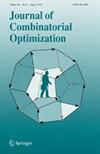计算最小和稳定反馈弧集的高效启发式方法
IF 1.1
4区 数学
Q4 COMPUTER SCIENCE, INTERDISCIPLINARY APPLICATIONS
引用次数: 0
摘要
给定一个有向图(G=(V,A)/),我们通过设计一种高效算法来搜索最小且稳定的反馈弧集,从而解决最小反馈弧集(MFAS)问题,即在不破坏非循环性的情况下,没有一个弧可以被重新引入图中,并且对于每个顶点,被消除的出(或入)弧数不大于剩余的入(或出)弧数。我们的算法具有良好的多项式上限,因此即使在大型图上也能应用。我们还引入了一种算法,用于生成反馈弧集有已知上限的强连接图,并在这些图上测试我们的算法。本文章由计算机程序翻译,如有差异,请以英文原文为准。

Efficient heuristics to compute minimal and stable feedback arc sets
Given a directed graph \(G=(V,A)\), we tackle the Minimum Feedback Arc Set (MFAS) Problem by designing an efficient algorithm to search for minimal and stable Feedback Arc Sets, i.e. such that none of the arcs can be reintroduced in the graph without disrupting acyclicity and such that for each vertex the number of eliminated outgoing (resp. incoming) arcs is not bigger than the number of remaining incoming (resp. outgoing) arcs. Our algorithm has a good polynomial upper bound and can therefore be applied even on large graphs. We also introduce an algorithm to generate strongly connected graphs with a known upper bound on their feedback arc set, and on such graphs we test our algorithm.
求助全文
通过发布文献求助,成功后即可免费获取论文全文。
去求助
来源期刊

Journal of Combinatorial Optimization
数学-计算机:跨学科应用
CiteScore
2.00
自引率
10.00%
发文量
83
审稿时长
6 months
期刊介绍:
The objective of Journal of Combinatorial Optimization is to advance and promote the theory and applications of combinatorial optimization, which is an area of research at the intersection of applied mathematics, computer science, and operations research and which overlaps with many other areas such as computation complexity, computational biology, VLSI design, communication networks, and management science. It includes complexity analysis and algorithm design for combinatorial optimization problems, numerical experiments and problem discovery with applications in science and engineering.
The Journal of Combinatorial Optimization publishes refereed papers dealing with all theoretical, computational and applied aspects of combinatorial optimization. It also publishes reviews of appropriate books and special issues of journals.
 求助内容:
求助内容: 应助结果提醒方式:
应助结果提醒方式:


